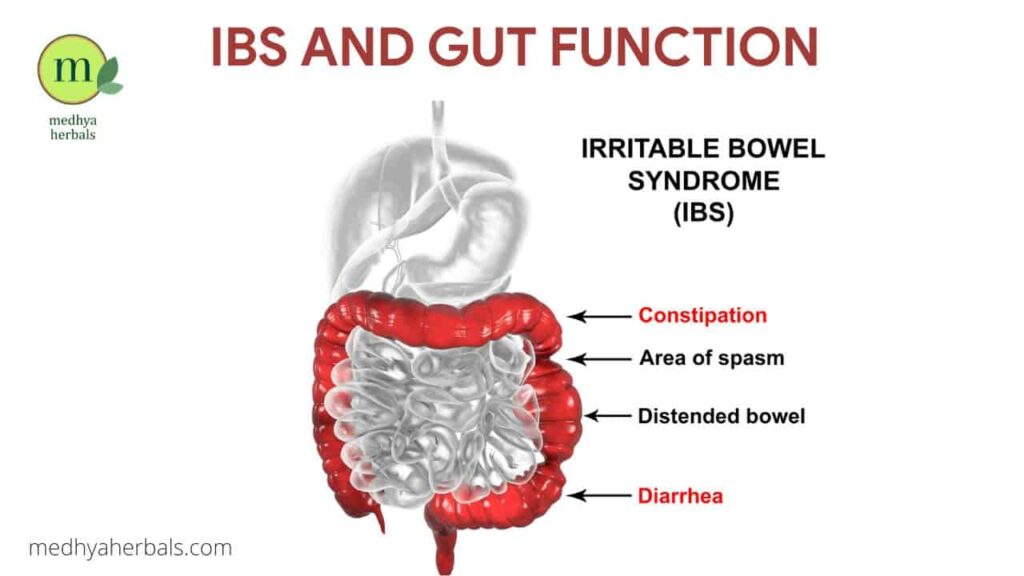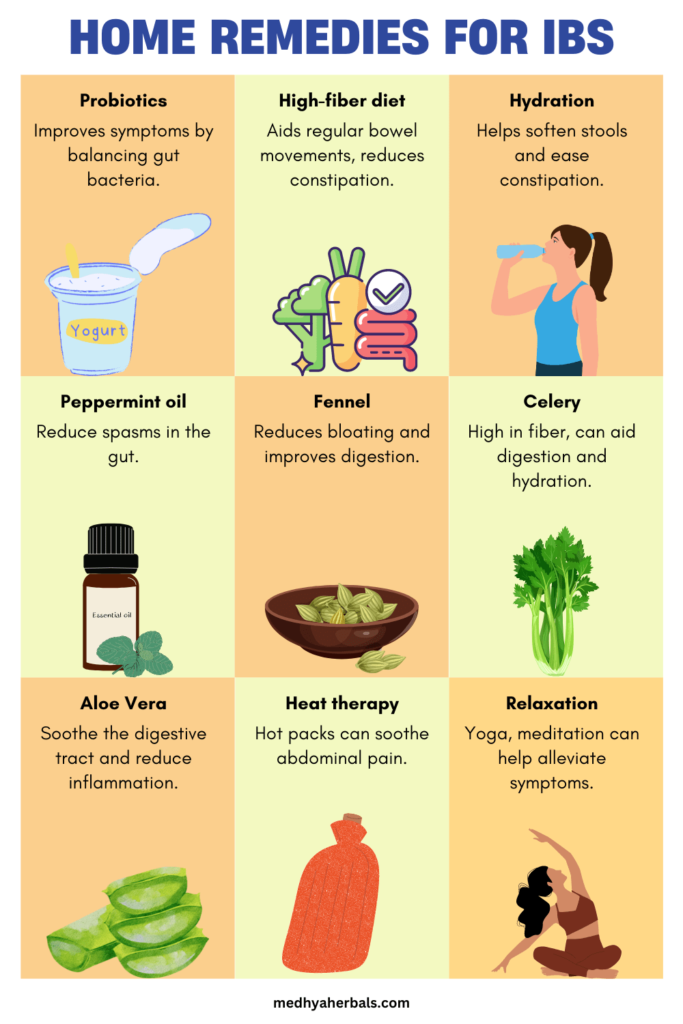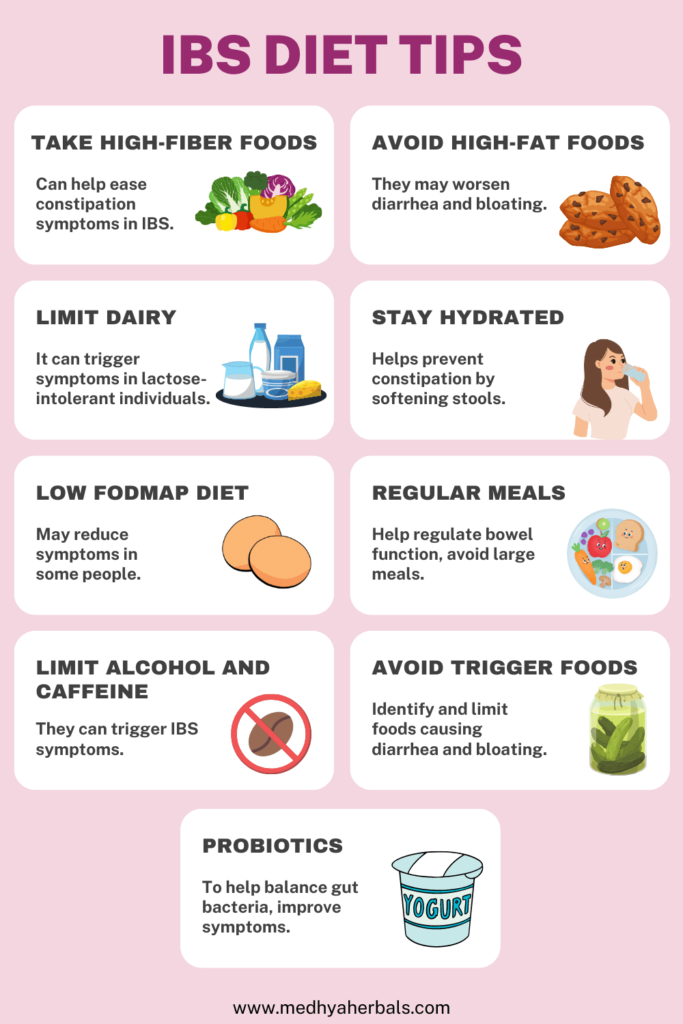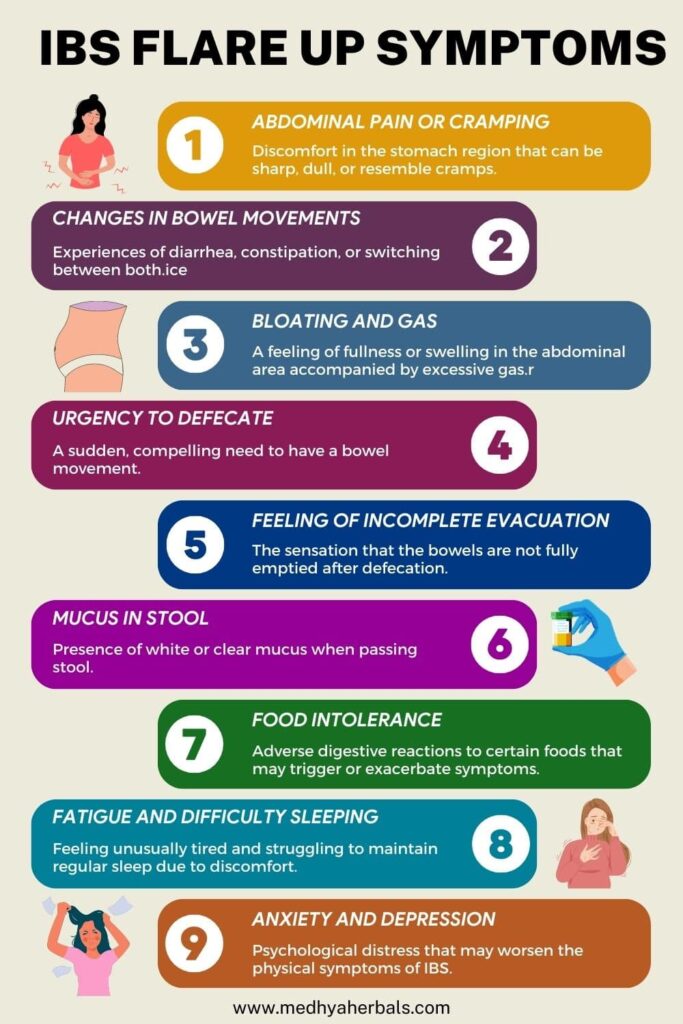The abdominal pain, bloating, constipation, and diarrhea that come with Irritable Bowel Syndrome (IBS) can be debilitating and affect your quality of life. If you’re struggling with the pain, discomfort, and frustration of IBS, you’re not alone. According to the International Foundation for Gastrointestinal Disorders, IBS affects up to 15% of the global population, and it is more common in women than men.
While, millions of people worldwide are affected by this chronic condition, but there is hope for relief. As an Ayurvedic Doctor, I have helped countless people manage the symptoms of Irritable Bowel Syndrome (IBS) and their gut health with natural and holistic remedies.
In this comprehensive guide, I will share with you the most effective natural IBS home remedies that you can use to heal your gut. From foods that fight IBS to herbs that cure it, you’ll learn everything you need to know to start feeling better and taking control of your digestion.
Read on to discover the top ten natural home remedies for IBS and start your journey towards a happier, healthier gut.

1. Probiotics
Probiotics are a type of beneficial bacteria that can help alleviate symptoms of IBS by restoring balance to the gut microbiome. In the short term, probiotics can provide relief from symptoms such as abdominal pain, bloating, and irregular bowel movements. But they can also have long-term benefits by building a healthy gut flora that can improve overall digestive health and boost the immune system.
Types of Probiotics
There are many different types of probiotics, each with its unique benefits. Lactobacillus and Bifidobacterium are two of the most common strains used to treat IBS. Lactobacillus has been shown to reduce bloating and gas, while Bifidobacterium can help regulate bowel movements.
One of the best sources of probiotics is fermented foods such as yogurt, kefir, sauerkraut, kimchi, and kombucha. These foods contain live cultures of beneficial bacteria that can help restore balance to the gut microbiome. If you’re lactose intolerant, you can opt for non-dairy sources of probiotics such as miso, tempeh, and natto.
Probiotics Supplements
In addition to fermented foods, there are also probiotic supplements available in capsule or powder form. When choosing a probiotic supplement, look for one that contains at least 1 billion colony-forming units (CFUs) of Lactobacillus and Bifidobacterium per serving. It’s also important to choose a reputable brand and store the supplement in a cool, dry place to maintain potency.
It’s worth noting that probiotics may not work for everyone with IBS, and some people may experience worsened symptoms. It’s always best to consult with a healthcare provider before starting any new supplements or making significant changes to your diet.

2. Fiber
Fiber is a type of carbohydrate found in plant-based foods that plays a crucial role in the digestive system. For people with IBS, increasing fiber intake can be a natural and effective way to manage symptoms such as constipation, diarrhea, and abdominal pain.
Fiber works in two ways to help with IBS symptoms. Firstly, it adds bulk to the stool, making it easier to pass and reducing constipation. Secondly, it can help regulate bowel movements and reduce diarrhea. In the long term, a high-fiber diet can improve overall gut health, lower the risk of colon cancer, and reduce the risk of heart disease.
Types of Fiber
There are two types of fiber: soluble and insoluble. Soluble fiber dissolves in water and forms a gel-like substance in the gut, which can help regulate bowel movements and reduce diarrhea. Insoluble fiber doesn’t dissolve in water and adds bulk to the stool, reducing constipation.
Good sources of soluble fiber include oats, barley, flaxseeds, chia seeds, psyllium husk, beans, peas, and some fruits such as apples, oranges, and berries. Insoluble fiber can be found in foods such as whole grains, nuts, seeds, and vegetables such as broccoli, cauliflower, and carrots.
It’s important to increase fiber intake gradually and drink plenty of water to avoid bloating and gas. Aim for 25-30 grams of fiber per day, and make sure to include a variety of high-fiber foods in your diet.
3. Ginger
Ginger is a well-known natural remedy that has been used for centuries to alleviate digestive discomfort, including symptoms of IBS such as abdominal pain, bloating, and nausea. Ginger has anti-inflammatory and antioxidant properties that can help reduce inflammation in the gut and improve overall gut health.
One of the main ways ginger can help with IBS symptoms is by reducing muscle spasms in the intestines. These spasms can cause cramping and abdominal pain, which ginger can help to relieve. Ginger can also stimulate digestion and increase the production of digestive enzymes, which can aid in the breakdown and absorption of nutrients from food.
How to Include Ginger in Your Diet?
To include ginger in your diet, you can add fresh ginger root to smoothies, teas, and stir-fries. Ginger supplements and ginger candies are also available, but it’s important to speak with your doctor before taking any supplements. It’s best to start with small amounts of ginger and gradually increase the dosage to avoid any potential side effects.
Best Tips for Ginger as Medicine
To increase the absorption of ginger, it’s best to consume it with a meal that contains some fat. This is because gingerols, the active compounds in ginger, are fat-soluble and can be better absorbed when consumed with a source of fat. Additionally, heat can increase the potency of ginger, so cooking ginger in meals or drinking hot ginger tea can be a good way to increase its effectiveness.
4. Turmeric
Turmeric is a popular spice that has been used for centuries in Ayurvedic medicine to treat a variety of health conditions, including digestive issues such as IBS. Turmeric contains a compound called curcumin, which has powerful anti-inflammatory and antioxidant properties that can help reduce inflammation in the gut and improve overall gut health.
One of the main ways that turmeric can help with IBS symptoms is by reducing inflammation in the gut. Inflammation can cause intestinal spasms, bloating, and abdominal pain, which can be reduced by the anti-inflammatory effects of turmeric. Additionally, turmeric can stimulate the production of bile, which can aid in the digestion and absorption of nutrients from food.
How to Take Turmeric for IBS Treatment?
To include turmeric in your diet, you can add fresh turmeric root or ground turmeric powder to meals such as curries, soups, and stews. Turmeric supplements are also available, but it’s important to speak with your doctor before taking any supplements. It’s best to start with small amounts of turmeric and gradually increase the dosage to avoid any potential side effects.
To increase the absorption of turmeric, it’s best to consume it with black pepper or a source of fat. This is because curcumin, the active compound in turmeric, is not easily absorbed by the body on its own. However, when consumed with black pepper or a source of fat, such as coconut oil or olive oil, the absorption of curcumin can be significantly increased.
5. Ash Gourd
Ash gourd, also known as winter melon or white pumpkin, is a common vegetable used in Ayurvedic medicine to treat a variety of digestive issues, including IBS and GERD (Gastroesophageal Reflux Disease).
This is because ash gourd has alkaline properties, which means it can help neutralize stomach acid and reduce the acidity in the digestive tract. In addition, ash gourd is rich in fiber, vitamins, and minerals, which can help regulate bowel movements and improve gut health.
The alkalizing properties of ash gourd also have a cooling effect on the body, which can help reduce burning sensation and irritation in the digestive tract. This can provide relief from symptoms such as bloating, nausea, and abdominal pain, which are common in individuals with IBS.
The high fiber content in ash gourd can help regulate bowel movements, which can provide short-term relief from symptoms such as constipation or diarrhea. Additionally, ash gourd contains antioxidants that can help reduce inflammation in the gut and improve overall gut health.
How to Take Ash Gourd for IBS Treatment?
To include ash gourd in your diet, you can add it to soups, stews, or curries. You can also juice the ash gourd and drink it as a beverage. It’s important to note that the skin of the ash gourd is not edible and should be removed before consuming.
To increase the absorption of the nutrients in ash gourd, it’s best to consume it with a source of fat. This is because many of the vitamins and minerals in ash gourd are fat-soluble, which means they require fat to be absorbed by the body. Adding a small amount of ghee or coconut oil to your ash gourd dish can help increase the absorption of these nutrients.

6. Aloe Vera
Aloe vera is a succulent plant that has been used for medicinal purposes for centuries. It is known for its anti-inflammatory properties and is a popular natural home remedy for IBS (Irritable Bowel Syndrome). Aloe vera can help alleviate IBS symptoms by soothing the digestive tract and reducing inflammation.
Short-term relief from IBS symptoms can be achieved by consuming aloe vera juice or gel. Aloe vera contains compounds called anthraquinones, which can stimulate the bowels and help relieve constipation. It can also help reduce diarrhea by regulating fluid levels in the digestive tract.
Long-term consumption of aloe vera can help improve overall digestive health by promoting the growth of healthy gut bacteria. Aloe vera contains prebiotics, which are fibers that feed the good bacteria in the gut. This can help improve the balance of bacteria in the gut, which can help reduce inflammation and improve digestion.
How to Take Aloe Vera for IBS?
To include aloe vera in your diet, it can be consumed as a juice or added to smoothies or other beverages. Aloe vera gel can also be added to foods or taken in supplement form. It is important to choose high-quality, pure aloe vera products to ensure maximum effectiveness.
To increase the absorption of aloe vera, it is recommended to consume it on an empty stomach. This allows the nutrients to be absorbed more easily into the bloodstream. It is also important to start with small doses and gradually increase as tolerated, as aloe vera can have a laxative effect in some individuals.
7. Flax Seeds
Flax seeds are an excellent natural home remedy for managing IBS symptoms. These tiny seeds are packed with fiber, which is essential for maintaining gut health. Flax seeds have a unique composition that makes them an effective treatment for IBS.
Flax seeds contain both soluble and insoluble fiber, which helps to regulate bowel movements and prevent constipation. Soluble fiber dissolves in water, forming a gel-like substance that helps to slow down digestion, while insoluble fiber adds bulk to the stool, making it easier to pass. The combination of both types of fiber in flax seeds helps to promote regularity and prevent both constipation and diarrhea.
Flax Seeds Nutrition
Flax seeds are also rich in omega-3 fatty acids, which have anti-inflammatory properties that can help to reduce inflammation in the gut. Inflammation is a common factor in IBS symptoms such as bloating, cramping, and abdominal pain. Omega-3 fatty acids can also help to regulate the immune system, which may be beneficial for those with IBS as it is thought to be related to immune system dysfunction.
How to Take Flax Seeds for IBS?
To include flax seeds in your diet, try adding them to smoothies, yogurt, oatmeal, or baked goods. Ground flax seeds are more easily digested and absorbed by the body than whole seeds, so it is recommended to grind them before consuming. You can also purchase flaxseed oil, which is a convenient way to add flax seeds to your diet.
It is important to note that flax seeds can cause digestive issues in some individuals if consumed in excess. Start with a small amount and gradually increase your intake over time. It is also important to drink plenty of water when consuming flax seeds to prevent constipation.

8. Triphala
Triphala is an Ayurvedic herbal remedy that has been used for centuries to treat various digestive problems, including IBS. It is a combination of three fruits – amla, haritaki, and bibhitaki – that work together to improve digestive health and relieve symptoms of IBS.
How Triphala Helps in IBS?
Triphala has been found to be effective in providing short-term relief from IBS symptoms such as bloating, constipation, and diarrhea. The fruits in Triphala contain high levels of antioxidants and anti-inflammatory compounds that help to reduce inflammation in the gut and promote the growth of healthy gut bacteria. This can help to alleviate symptoms of IBS and improve overall digestive function.
Triphala is also beneficial for long-term digestive health. It has been shown to improve gut motility, which helps to reduce the risk of constipation and other digestive disorders. Additionally, Triphala helps to regulate the production of digestive enzymes, which aids in the proper breakdown and absorption of nutrients from food.
How to Take Triphala for IBS?
Triphala is available in different forms, including powder, capsule, and tablet. It can be consumed orally with water, mixed with honey or ghee, or taken with warm water as a decoction. The recommended dosage of Triphala varies depending on the form of the supplement and the severity of the symptoms.
Triphala can be consumed with black pepper or ginger, which helps to increase its absorption and efficacy. It is also recommended to take Triphala on an empty stomach to improve its absorption and avoid any interactions with other medications or supplements.
9. Peppermint
Peppermint is a natural herb that has been used for centuries to treat various digestive disorders, including irritable bowel syndrome (IBS). Peppermint is known for its soothing properties and ability to relieve bloating, gas, and cramping associated with IBS. In this article, we will explore how peppermint can be used as a natural home remedy for IBS.
How Peppermint Helps in IBS?
Peppermint works as a natural antispasmodic, which means it can help relax the muscles in the digestive tract and reduce cramping. Peppermint also has a cooling effect that can provide relief from bloating and gas. Studies have shown that peppermint oil can be effective in reducing IBS symptoms, including abdominal pain, bloating, and gas.
In addition to providing short-term relief from IBS symptoms, peppermint may also have long-term benefits for digestive health. Research suggests that peppermint can help regulate digestive motility, which can improve bowel regularity and reduce constipation. Peppermint also has anti-inflammatory properties that can reduce inflammation in the digestive tract and promote overall gut health.
How to Take Peppermint for IBS?
Peppermint can be consumed in various forms, including tea, capsules, and essential oil. Peppermint tea is a simple and effective way to consume peppermint and can be found in most grocery stores. Peppermint capsules are also available over-the-counter and are a convenient option for those who prefer not to consume tea. Peppermint essential oil can be used topically or aromatically but should not be ingested.
To maximize the absorption of peppermint, it is best to consume it on an empty stomach. Drinking peppermint tea first thing in the morning or between meals is recommended. It is also important to use high-quality peppermint products and to follow dosage instructions carefully. Ingesting too much peppermint oil can cause adverse effects, including heartburn and nausea.
10. Celery
Celery, a crunchy green vegetable, is a natural home remedy for IBS. It is rich in fiber, vitamins, and minerals that help to regulate digestion and reduce inflammation in the gut. Celery also contains antioxidants that help to prevent damage to cells in the body.
How Celery Helps?
Celery is an excellent source of fiber, which is essential for healthy digestion. It helps to keep the digestive tract moving and prevents constipation, which is a common symptom of IBS. The high water content of celery also helps to keep the stool soft and easy to pass.
Celery contains a compound called apigenin, which has anti-inflammatory properties. Chronic inflammation is a common factor in many chronic diseases, including IBS. Consuming celery regularly can help to reduce inflammation in the gut, leading to long-term health benefits.
How to Take Celery for IBS Treatment?
Celery can be eaten raw or cooked, depending on your preference. You can add chopped celery to salads, soups, or stir-fries. It can also be juiced or blended into smoothies for a refreshing drink. For a tasty snack, you can spread peanut butter or hummus on celery sticks.
To increase the absorption of nutrients from celery, it is best to chew it thoroughly or blend it into a smoothie. Chewing breaks down the fiber, making it easier for the body to absorb the nutrients. Blending also breaks down the fiber, making it easier for the body to digest and absorb
Conclusion
Irritable Bowel Syndrome can be a challenging and frustrating condition to deal with. While there are many pharmaceutical options for managing the symptoms, they don’t treat IBS at the root cause level, thus leaving you in a fire fighting mode all the time.
Natural home remedies on the other hand can provide relief and contribute to long-term gut health. By incorporating probiotics, fiber-rich foods, ginger, turmeric, ash gourd, aloe vera, flax seeds, triphala, peppermint, and celery into your diet, you can help alleviate symptoms and prevent IBS flare-ups.
If you’re struggling with IBS and are looking for a natural, long-term solution, schedule a consultation with our experienced Ayurvedic doctors at Medhya Herbals today. We’ll provide you with a personalized treatment plan tailored to your unique needs, helping you find the relief you deserve. Don’t let IBS control your life any longer – take the first step towards a happier, healthier future by contacting us now.
References
- “Effect of probiotic Bifidobacterium bifidum G9-1 on the relationship between gut microbiota profile and stress in healthy adults” https://pubmed.ncbi.nlm.nih.gov/30738054/
- “Efficacy of probiotics in irritable bowel syndrome: a meta-analysis of randomized, controlled trials.” https://pubmed.ncbi.nlm.nih.gov/21248165/
- “Effect of ginger on gastric motility and symptoms of functional dyspepsia.” https://pubmed.ncbi.nlm.nih.gov/23123794/
- “The therapeutic potential of turmeric in treatment of gastrointestinal disorders including gastrointestinal cancers by targeting inflammation and oxidative stress.” https://pubmed.ncbi.nlm.nih.gov/32166866/
- “Gastroprotective effect of aloe vera mucilage against ethanol-induced gastric injury in rats: role of antioxidants and free radicals scavenging property.” https://pubmed.ncbi.nlm.nih.gov/21457902/
- “Effects of flaxseed supplements on blood pressure: a systematic review and meta-analysis of controlled clinical trial” https://pubmed.ncbi.nlm.nih.gov/32182241/
- “The effects of triphala on serum levels of interleukin-6, tumor necrosis factor-α, and C-reactive protein: a systematic review and meta-analysis.” https://pubmed.ncbi.nlm.nih.gov/31102365/
- “Systematic review with meta-analysis: peppermint oil for the treatment of irritable bowel syndrome.” https://pubmed.ncbi.nlm.nih.gov/26179940/
- “The effect of celery (Apium graveolens L.) on metabolic syndrome: A review.” https://www.ncbi.nlm.nih.gov/pmc/articles/PMC6261177/

